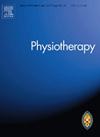A core capability framework for physiotherapists to deliver quality care when working with people living with dementia and their families/caregivers: an international modified e-Delphi study
IF 3.1
3区 医学
Q1 REHABILITATION
引用次数: 0
Abstract
Objective
What are the core capabilities physiotherapists need to deliver quality care when working with people with dementia and their families/caregivers?
Design
A three-round modified e-Delphi study.
Participants
Panel members were physiotherapists experienced in working with people with dementia and/or educating and/or researching in the dementia field.
Methods
A steering group (16 international physiotherapists and a consumer) developed a draft framework including 129 core capabilities across 5 domains for panel members to rate their appropriateness for inclusion as a core capability to provide high quality care to people with dementia and their caregivers/families. The RAND/UCLA method was used to assess consensus.
Results
Thirty-five physiotherapists from 11 countries participated in Round 1, 31 (89%) in Round 2 and 28 (80% of Round 1) in Round 3. All core capabilities were rated appropriate for inclusion in each round. Panel members recommended wording refinements across the rounds and suggested 51 core capabilities for consideration. Three rounds were needed to reach consensus, resulting in 137 core capabilities rated appropriate for inclusion across 5 domains: 1) Knowledge and understanding, n = 36; 2) Assessment, n = 39; 3) Management, interventions and prevention n = 40; 4) Communication, therapeutic relationship and person-centred care, n = 17; and 5) Physiotherapists self-management and improvement, n = 5.
Conclusions
This e-Delphi study outlines the core capabilities physiotherapists need to provide high quality care to people with dementia and their families/caregivers. These core capabilities can be used by physiotherapists to help identify knowledge/skill gaps, as well as by educators to improve their training of undergraduate and postgraduate students, and clinicians.
Contribution of Paper
- •This e-Delphi study has developed, through expert consensus, the first comprehensive physiotherapy specific core capability framework for providing high-quality care to people with dementia and their families/caregivers.
- •The core capability framework can be used by physiotherapists to identify knowledge and/or skill gaps, and by physiotherapy educators to assist with entry-level and post-graduate curriculum development and student/workforce training.
- •As physiotherapists play a vital role in working with people with dementia and their caregivers/families, and competencies lie at the heart of effective quality care and service delivery, the newly developed core capability framework serves as basis for broader consultation and input.
物理治疗师为痴呆症患者及其家人/护理人员提供优质护理服务的核心能力框架:国际改良电子德尔菲法
物理治疗师在为痴呆症患者及其家人/护理人员提供优质护理服务时,需要具备哪些核心能力?三轮修改后的 e-Delphi 研究。小组成员均为在痴呆症患者工作和/或痴呆症领域教育和/或研究方面经验丰富的物理治疗师。一个指导小组(16 位国际物理治疗师和一位消费者)制定了一个框架草案,其中包括 5 个领域的 129 项核心能力,供小组成员评定其是否适合作为向痴呆症患者及其护理者/家属提供高质量护理的核心能力。采用兰德/加州大学洛杉矶分校的方法来评估共识。来自 11 个国家的 35 名物理治疗师参加了第一轮,31 名(89%)参加了第二轮,28 名(占第一轮的 80%)参加了第三轮。所有核心能力均被评为适合纳入每一轮。专家组成员建议对各轮的措辞进行改进,并提出了 52 项核心能力供考虑。需要经过三轮讨论才能达成共识,最终有 137 项核心能力被评为适合纳入 5 个领域:1) 知识和理解 = 36;2) 评估 = 39;3) 管理、干预和预防 = 40;4) 沟通、治疗关系和以人为本的护理 = 17;5) 物理治疗师自我管理和改进 = 5。本电子德尔菲概述了物理治疗师为痴呆症患者及其家人/护理人员提供高质量护理所需的核心能力。物理治疗师可利用这些核心能力来帮助确定知识/技能差距,教育工作者也可利用这些核心能力来改善对本科生、研究生和临床医师的培训。
本文章由计算机程序翻译,如有差异,请以英文原文为准。
求助全文
约1分钟内获得全文
求助全文
来源期刊

Physiotherapy
医学-康复医学
CiteScore
6.40
自引率
3.00%
发文量
377
审稿时长
82 days
期刊介绍:
Physiotherapy aims to publish original research and facilitate continuing professional development for physiotherapists and other health professions worldwide. Dedicated to the advancement of physiotherapy through publication of research and scholarly work concerned with, but not limited to, its scientific basis and clinical application, education of practitioners, management of services and policy.
We are pleased to receive articles reporting original scientific research, systematic reviews or meta-analyses, theoretical or debate articles, brief reports and technical reports. All papers should demonstrate methodological rigour.
 求助内容:
求助内容: 应助结果提醒方式:
应助结果提醒方式:


